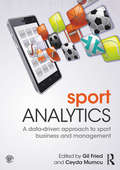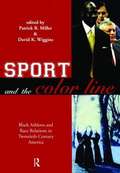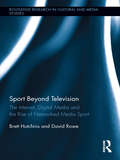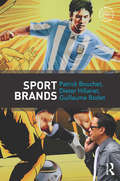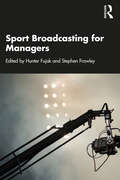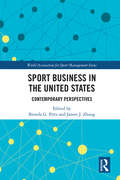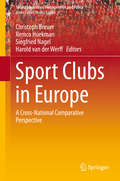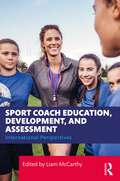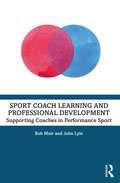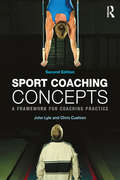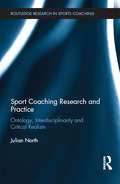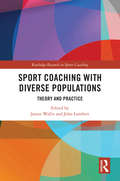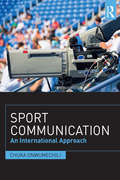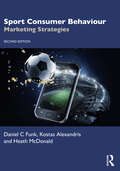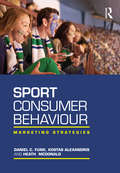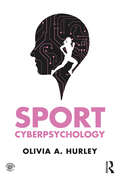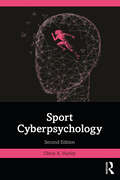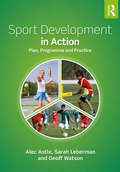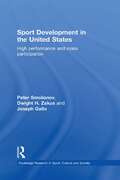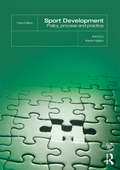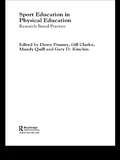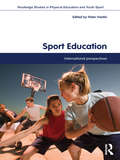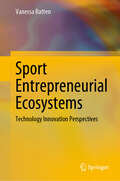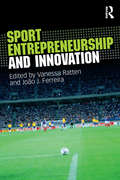- Table View
- List View
Sport Analytics: A data-driven approach to sport business and management
by Gil Fried and Ceyda MumcuThe increasing availability of data has transformed the way sports are played, promoted and managed. This is the first textbook to explain how the big data revolution is having a profound influence across the sport industry, demonstrating how sport managers and business professionals can use analytical techniques to improve their professional practice. While other sports analytics books have focused on player performance data, this book shows how analytics can be applied to every functional area of sport business, from marketing and event management to finance and legal services. Drawing on research that spans the entire sport industry, it explains how data is influencing the most important decisions, from ticket sales and human resources to risk management and facility operations. Each chapter contains real world examples, industry profiles and extended case studies which are complimented by a companion website full of useful learning resources. Sport Analytics: A data-driven approach to sport business and management is an essential text for all sport management students and an invaluable reference for any sport management professional involved in operational research.
Sport And The Color Line: Black Athletes And Race Relations In Twentieth-Century America
by Patrick Miller David WigginsThe year 2003 marks the one-hundredth anniversary of W.E.B. Du Bois' "Souls of Black Folk," in which he declared that "the color line" would be the problem of the twentieth century. Half a century later, Jackie Robinson would display his remarkable athletic skills in "baseball's great experiment." Now, "Sport and the Color Line" takes a look at the last century through the lens of sports and race, drawing together articles by many of the leading figures in Sport Studies to address the African American experience and the history of race relations. <P><P> The history of African Americans in sport is not simple, and it certainly did not begin in 1947 when Jackie Robinson first donned a Brooklyn Dodgers uniform. The essays presented here examine the complexity of black American sports culture, from the organization of semi-pro baseball and athletic programs at historically black colleges and universities, to the careers of individual stars such as Jack Johnson and Joe Louis, to the challenges faced by black women in sports. <P><P>What are today's black athletes doing in the aftermath of desegregation, or with the legacy of Muhammad Ali's political stance? The essays gathered here engage such issues, as well as the paradoxes of corporate sport and the persistence of scientific racism in the athletic realm.
Sport Beyond Television: The Internet, Digital Media and the Rise of Networked Media Sport (Routledge Research in Cultural and Media Studies)
by David Rowe Brett HutchinsTelevision is no longer the only screen delivering footage and news to people about sport. Computers, the Internet, Web, mobile and other digital media are increasingly important technologies in the production and consumption of sports media. Sport Beyond Television analyzes the changes that have given rise to this situation, combining theoretical insights with original evidence collected through extensive research and interviews with people working in the media and sport industries. It locates sports media as a pivotal component in online content economies and cultures, and counteracts the scant scholarly attention to sports media when compared to music, film and publishing in convergent media cultures. An expanding array of popular sports media – industry, user, club, athlete and fan produced – is now available and accessible in networked digital communications environments. This change is confounding the thinking of major sports organizations that have lived off the generous revenue flowing from exclusive broadcast contracts with free-to-air and subscription television networks for the last five decades. These developments are creating commercial and policy confusion, particularly as sports audiences and the advertising market fragment in line with the proliferation of niche channels and sources of digital sports media. Chapters in this title examine the shift from broadcast to online sports media markets, the impact of social networking platforms like Twitter and Facebook, evolving user and fan practices, the changing character of sports journalism, and the rise of sports computer gaming. Each chapter traces the socio-cultural implications of trends and trajectories in media sport.
Sport Branding Insights (Sport Business Insights)
by Constantino Stavros Aaron C.T. SmithIn a sporting world dominated by media and money, an understanding of sport branding is an essential skill for any sport manager. Success means being able to ‘brand’ – and therefore differentiate – a sport club, player, code, or event in a highly competitive entertainment market. For anyone seeking to understand or manage sport, this book offers an immediate and salient insight into the complex and dynamic process of creating a powerful sport brand. The book explains how a sport brand goes beyond just an identifying badge, reinforced by a name or a logo that helps sport consumers recognise a product or an organisation. It reveals how a brand becomes linked with consumers’ opinions and perceptions of a sport product and the organisation that owns it. Readers will learn how to create a powerful brand that has both recognition in the market and strong associated imagery, by imbuing it with a spirit of the past through appeals to tradition, by endowing it with human qualities of emotionality, thought, and volition, and through the use of characters, colours, texts, and symbols. It also provides a brief guide to the new domains of digital sport branding and social media. Concise, informative, and entertaining, this is an essential resource for anyone exploring or practising the business of sport.
Sport Brands
by Patrick Bouchet Dieter Hillairet Guillaume BodetSport brands are a central element of modern sport business and a ubiquitous component of contemporary global culture. This groundbreaking book offers a complete analysis of the topic of sport brands from both a marketing management approach (strategy and implementation) and a psycho-sociological approach (consumption and wider society). In doing so it explores both supply and demand sides, offering a complete introduction to the nature, purpose and value of sport brands not found in any other sports marketing text. The book covers the whole heterogeneity of sport brands, going much further than the sport team and league brands covered in most other books. As well as teams and leagues, the book considers the brands of sports celebrities, events, media, computer games and governing bodies, as well as the ethical, professional and technological ‘label brands’ associated with sport. Richly illustrated with cases, examples and data, the book explores the tangible and intangible influence of sport brands, their economic and social value, and the subcultures and communities that grow up around them. It also introduces common strategies for growing brands, and growing through brands, and examines the challenges and threats that sport brands face, from boycotts and ambush marketing to counterfeiting. An understanding of sport brands is essential for a fully rounded understanding of contemporary sport marketing. As a result, this book is important reading for any student or practitioner working in sport marketing, sport business, or mainstream marketing management.
Sport Broadcasting for Managers
by Stephen Frawley Hunter FujakThis is the first book to focus on sport broadcasting as a core aspect of contemporary sport business and management. It explains how sport business professionals can manage sport broadcasting as an essential component of their work. Drawing on cutting-edge theory and research into sport broadcasting around the world, the book introduces the history and core concepts of sport broadcasting, before showing how broadcasting intersects with sport management practice. It covers key themes and issues such as the law and regulation, valuation and negotiation, strategy, logistics and consumer behaviour. Outlining best practice for sport managers, this book is essential reading for any course on sport business and management, sport marketing or sport media, and a useful companion to courses on broadcast production, sports journalism or digital media.
Sport Business in the United States: Contemporary Perspectives (World Association for Sport Management Series)
by Brenda G. Pitts; James J. ZhangSport is big business in the USA. From collegiate sport through to the professional leagues, the sport industry generates huge revenues, employs thousands of people and engages millions of fans and consumers. This book offers an evidence-based snapshot of the contemporary sport industry in the USA. Featuring new research from scholars working across every sector of sport business, the book covers key topics such as consumer behaviour, sport marketing, the development of women&’s sport, sport broadcasting, internships, and leadership. It adds critical depth to our understanding of the sport industry in the world&’s single biggest sport marketplace. Sport Business in the United States offers fascinating new perspectives for researchers, students and industry professionals. It is important reading for anybody working in sport management or sport business, whether inside the US or around the world.
Sport Clubs in Europe
by Christoph Breuer Remco Hoekman Siegfried Nagel Harold van der WerffThis book presents an up-to-date portrait of the characteristics of sport clubs in various European countries and their role in society and the national sport system. Furthermore, it offers a cross-national comparative perspective of sport clubs in twenty European countries. Containing both empirical data and information on the political and historical backgrounds of sport clubs, the book is organized in three parts. First, the authors provide an overview of the theoretical approach of the book and a description of the framework used for the country chapters. Second, the country chapters, written by experts within the field, provide a systematic overview of the available information on sport clubs in each country. These chapters are structured to answer the following questions: (1) What is the position of sport clubs within the national sport structure? (2) Which role do they fulfil in policy and society? (3) What are their basic characteristics and what factors influence the development of sport clubs? The book is concluded with a systematic comparison of the participating countries with the purpose of forging a clear link between the functioning of policy systems, observed problems, and possible solutions, and with a future research agenda on sport clubs. In an era of increased collaboration between European states, sport provides a natural vehicle through which to compare changes in culture, economics, and policy across nations. Sport Clubs in Europe will appeal to scholars of nonprofit management, sports management and sports sociology as well as administrators and policy makers in the international sports community.
Sport Coach Education, Development, and Assessment: International Perspectives
by Liam McCarthySport Coach Education, Development, and Assessment offers a range of coach assessment ideas and practices from leaders in the coach education and development field. A combination of theory- and practice-focused chapters aims to stimulate thoughts, dialogue, and actions. Sport coaches play an increasingly important role in delivering positive outcomes through sport for individuals, groups, and societies at large. It is understandable, therefore, that attention is increasingly being directed towards how coaches are supported in their roles. Perhaps the most dominant support mechanism is large-scale coach education programmes. These professional development opportunities invite coaches to participate in a learning experience which typically involves exposure to new ideas, opportunities to practice, and an assessment.Much has been said and written about the extent to which these programmes are effective and the degree to which they contribute to coach learning, or not. These discussions typically reference the learning environment, nature of the curriculum, and report coaches’ experiences. However, lacking in these discussions is any deliberation over coach assessment, as a consistent feature of nearly all of these programmes, the world over.This book reflects a very deliberate attempt to platform and promote the issue of coach assessment. This book is designed to offer support and guidance to sport coaches who are engaged in assessment, coach educators/developers who are delivering assessment activities, and programme designers/policy architects who are creating learning opportunities for coaches.
Sport Coach Learning and Professional Development: Supporting Coaches in Performance Sport
by John Lyle Bob MuirSport Coach Learning and Professional Development describes the genesis and theoretical foundations of an emerging workflow for supporting sport coaches learning and professional development in performance and high‑performance sport. It is the clear exposition and critical insight into coaches’ learning and professional development, and of coaching practice, that provides the foundations for an Embedded, Relational and Emergent Coach Learning and Professional Development Strategy.Learning and development is not something that can be ‘done’ to people; rather, it is about working alongside, supporting experienced coaches to identify and resolve meaningful questions that generate personal and professional growth. This approach more appropriately attends to individual differences in biographies, perspectives, roles and socio‑ultural settings. Whilst the focus and nature of support shifts to reflect the goals that coaches and athletes are working towards relative to the changing demands of their context, the approach consistently centres around three overlapping themes:1 Supporting coaches to learn through and from their everyday experiences.2 Supporting coaches to reflect on and explore the nature of the experiences they create for others.3 Supporting coaches by being available, listening, offering reassurance, support and caring.Working through this process necessitates close cooperation and frequently incorporates reflective dialogue, collaborative planning and shared enquiry. The work is therefore both relational and developmental. Coach and coach developer both bring something to the working relationship, which in turn shapes and influences the nature of the work undertaken. The nature of the goals pursued, the strategies employed and the collective courses of action taken are always shaped and influenced by the interpersonal resources that emerge through the work together (the overlap).The application and effective deployment of the strategy is illustrated and illuminated in a series of case studies. These demonstrate not only the efficacy of the strategy but also the lessons learned from working with coaches in their embedded contexts. This book is a key resource for coaches, coach developers, students and researchers working in the overlapping fields of sport coaching, learning and professional development.
Sport Coaching Concepts: A framework for coaching practice
by Chris Cushion John LyleCoaching is a vital factor for success in sport at all levels. Sport Coaching Concepts offers a comprehensive introduction to the theoretical issues that underpin sport coaching practice. Now in a fully revised and updated new edition, it explains why a conceptual approach to sport coaching is more important than ever before, using practice-orientated analysis to help students develop a full understanding of coaching theory and technique. Drawing on more than a decade’s worth of research, the book reflects upon the profound changes that have transformed coach education and development. It covers all the key topics of the sport coaching curriculum and includes six new chapters on the evolution of coaching theory, coaching expertise, decision making, social perspectives on the coach–athlete relationship, social inclusion and principles of coach development. Each chapter contains a full range of pedagogical features to aid learning, including discussion questions, practical projects, guides to further reading, case studies and insights from practising coaches. Sport Coaching Concepts is essential reading for all students of sport coaching and any serious coaches looking to develop their own coaching practice.
Sport Coaching Research and Practice: Ontology, Interdisciplinarity and Critical Realism (Routledge Research in Sports Coaching)
by Julian NorthResearch shapes our understanding of practice in powerful and important ways, in sports coaching as in any other discipline. This innovative study explores the philosophical foundations of sport coaching research, examining the often implicit links between research process and practice, descriptions and prescriptions. Arguing that the assumptions of traditional single-disciplinary accounts, such as those based in psychology or sociology, risk over-simplifying our understanding of coaching, this book presents an alternative framework for sports coaching research based on critical realism. The result is an embedded, relational and emergent conception of coaching practice that opens new ways of thinking about coaching knowledge. Drawing on new empirical case study research, it demonstrates vividly how a critical realist-informed approach can provide a more realistic and accountable knowledge to coaching stakeholders. This knowledge promises to have important implications for coaching, and coach education and development practices. Sport Coaching Research and Practice: Ontology, Interdisciplinarity and Critical Realism is fascinating reading for any student or researcher working in sports coaching, sport pedagogy, physical education, the philosophy or sociology of sport, or research methodology in sport and exercise.
Sport Coaching with Diverse Populations: Theory and Practice (Routledge Research in Sports Coaching)
by James Wallis and John LambertSports coaches apply their skills in a wider variety of contexts, and with a more diverse range of athletes and participants, than ever before. This book introduces the professional competencies and knowledge needed to build successful working relationships across the different communities and groups with which coaches operate. The book offers important insight for coaches who work with specific populations including different age groups; black, Asian and minority ethnic (BAME) people; those of different gender or sexual orientation; individuals with disabilities or illness; the socio-economically disadvantaged; and refugees. Drawing on real-world case studies, such as coaching girls in combat sports and coaching cardiac rehab patients, and adopting a critical approach to values, philosophy and pedagogic process, this book argues that understanding the recipient of coaching and their particular needs is as important as content knowledge. With contributions from leading coaching researchers and practitioners, this is important reading for developing coaches, students on sports courses and other individuals involved in the sport pedagogy domain who seek to gain a better understanding of the demands of meeting the specific needs of people in the coaching process.
Sport Communication: An International Approach
by Chuka OnwumechiliSport is a global business. Now more than ever, sport communication professionals need to understand sport’s global reach in order to develop their full potential. This is the first textbook to introduce the fundamental principles and practice of sport communication from an international perspective. Combining business strategies with insights into social issues such as gender, disability and national identity, this is an accessible, practical and engaging guide to the essentials of sport communication. Aimed to enhance learning at both undergraduate and postgraduate levels, each chapter contains special features tailored to meet the needs of students and instructors. These include learning objectives, chapter summaries, activities, reflections, discussion questions, recommended resource lists and original cross-cultural case studies that demonstrate sport communication theories put into practice. Its twenty chapters explore communication in sport across all levels, from interpersonal communication and team building to strategic communications, and in all forms of media, from print and broadcast to social media. Sport Communication: An International Approach is an essential text for any course on sport communication, sport business or sport management.
Sport Consumer Behaviour: Marketing Strategies
by Kostas Alexandris Heath McDonald Daniel C FunkNow in a fully revised and updated second edition, this textbook offers a complete introduction to consumer behaviour in sport and recreation. Combining theory and cutting-edge research with practical guidance and advice, it helps students and industry professionals become more effective practitioners. Written by three of the world’s leading sports marketing academics, the book covers all the key topics in consumer behaviour, including: • user experience and service design • segmenting consumer markets, building profiles, and branding • decision-making and psychological consequences • consumer motivation, constraints, and personalities • service quality and customer satisfaction • sociocultural and technological advancements influencing consumption This updated edition includes expanded coverage of key emerging topics such as technology (from streaming apps to wearables), e-sports and gamification, consumer research, brand architecture, consumer decision making, and fan attitudes. Including international examples throughout, it helps the reader to understand customer motivation and how that drives consumption and how design-relevant factors influence user experiences and can be used to develop more effective marketing solutions. This book is an invaluable resource for anyone involved in the sport, recreation, and events industries, from students and academics to professional managers. An accompanying eResource provides quizzes exclusively for instructors to assist student learning.
Sport Consumer Behaviour: Marketing Strategies
by Kostas Alexandris Heath McDonald Daniel C. FunkAll successful marketing strategies in sport or events must take into account the complex behaviour of consumers. This book offers a complete introduction to consumer behaviour in sport and events, combining theory and cutting-edge research with practical guidance and advice to enable students and industry professionals to become more effective practitioners. Written by three of the world’s leading sports marketing academics, it covers a wide range of areas including: social media and digital marketing the segmentation of the sport consumer market service quality and customer satisfaction sport consumer personalities and attitudes the external and environmental factors that influence sport consumer behaviour. These chapters are followed by a selection of international case studies on topics such as female sport fans, college sports, marathons and community engagement. The book’s companion website also provides additional resources exclusively for instructors and students, including test banks, slides and useful web links. As the only up-to-date textbook to focus on consumer behaviour in sport and events, Sport Consumer Behaviour: Marketing Strategies offers a truly global perspective on this rapidly-growing subject. This book is an invaluable resource for anyone involved in the sport and events industries, from students and academics to professional marketers.
Sport Cyberpsychology
by Olivia A. HurleySport Cyberpsychology is the first book devoted to assessing the influence of technology on human interaction, behaviour and mental health in a sport context, gathering research on the use of technology and the Internet by athletes, coaches and sport science support staff. The book identifies the potential impact of technology on athletes' mental preparation for competition, as well as the role of technology in improving performance. It explores the use of technology by athletes and sport organisations for social interaction, while also considering the 'darker' side of athletes’ Internet use. It covers topics including: the role of GPS, gaming and virtual reality in training and injury recovery the use of social media by athletes and sport organisations the psychology of self-presentation and brand management, as well as issues of online privacy the use of technology by other elite groups, such as military and medical personnel, and non-elite sportspeople cyberbullying and online harassment of athletes online gambling and athletes' mental health in relation to their online activities virtual learning environments and the educational opportunities the online world can offer athletes Accessibly written, with a companion website featuring lecture slides, reading lists, video links and suggested social media accounts, Sport Cyberpsychology offers a complete resource for students and instructors alike. It is important reading for any students of sport psychology, sport coaching or sport media, as well as coaches, athletes and sport science support staff.
Sport Cyberpsychology
by Olivia A. HurleyThe new edition of Sport Cyberpsychology is the only textbook in this field that provides a detailed overview of theories, concepts and research findings specifically related to the discipline of sport cyberpsychology. Post-pandemic, this new edition explores the vast psychological impact technology has on athletes' thoughts, emotions and preparations for their sport, as well as the role technology plays in sport consulting, officiating and social interactions. It covers topics that include performance-enhancing technologies, social media use by athletes and sport personnel (e.g., sport officials) and the role of technology in sport psychology consulting. Problematic behaviours athletes may encounter or engage in within the online world, such as their experiences with cyberbullying and online gambling are also discussed.This second edition includes a review of the latest esports research and activities that are gaining global popularity. The final chapter presents some new research horizons in the field of sport cyberpsychology. The book includes a range of helpful features including case studies, open-ended discussion questions, suggestions for future research studies and extensive reference lists.Accessibly written, this edition of Sport Cyberpsychology offers a one-stop, engaging resource for students and instructors alike. It is important reading for students of sport psychology, cyberpsychology, sport coaching, sport officiating and sport technology, as well as coaches, traditional athletes, esports athletes, sport scientists and performers in areas such as dance, the arts, the military and medicine.
Sport Development in Action: Plan, Programme and Practice
by Geoff Watson Alec Astle Sarah LebermanThis practical textbook explains the sport development process from a practitioner’s viewpoint, showing what actually works, how, and why. Focusing on the development of sport, the book considers the efforts of sport organisations to revitalise their sports at a community level to ensure their future relevance, growth, and sustainability. Full of real-world cases and data, as well as the voices and reflections of a wide range of practitioners, Sport Development in Action explains how to research and draw up a development plan, how to design and implement programmes and establish delivery networks, and how to monitor and evaluate initiatives. This is essential reading for any sport development course, and useful reading for courses in sport management, sports coaching, or sports studies. It is also an indispensable reference book for practitioners.
Sport Development in the United States: High Performance and Mass Participation (Routledge Research in Sport, Culture and Society)
by Peter Smolianov Dwight Zakus Joseph GalloThe development of both elite, high performance sport and mass participation, grassroots-level sport are central concerns for governments and sports governing bodies. This important new study is the first to closely examine the challenges and opportunities for sports development in the United States, a global sporting giant with a unique, market-driven sporting landscape. Presenting an innovative model of integrated sports development, the book explores the inter-relationship between elite and mass sport across history, drawing on comparative international examples from Australia to the former USSR and Eastern bloc countries. At the heart of the book is an in-depth empirical study of three (traditional and emerging) sports in the US – tennis, soccer and rugby – that offer important lessons on the development of elite sport, methods for increasing participation, and the establishment of new sports in new markets. No other book has attempted to model sports development in the United States in such depth before. Therefore this should be essential reading for all students, researchers, administrators or policy-makers with an interest in sports development, sports management, sports policy, or comparative, international sport studies.
Sport Development: Policy, Process and Practice, third edition (Sport For Sport: Theoretical And Practical Insights Into Sports Development Ser.)
by Kevin HyltonAt a time of profound change in the economic, social, political and sporting landscape, sport development faces important challenges. Now in a fully revised and updated third edition, Sport Development: Policy, Process and Practice is still the most detailed, authoritative and comprehensive guide to all aspects of contemporary sport development. This book examines the roles of those working in and around sport development and explores the most effective methods by which professionals and volunteers can promote interest, participation or performance in sport. Combining essential theory with practical analysis, the book covers key topics, themes and issues found on the sport development curriculum, including: Sport policy Developing ‘Sport for All’ Community sport development Partnerships in sport PE and school sport Sport and health Resources for developing sport Voluntary sports clubs Sport development and coaching Disability and sport development Researching and evaluating sport development The Olympic and Paralympic Games International sport and development Each chapter contains a full range of pedagogical features to aid learning and understanding, including revision questions, and case studies, while a new companion website provides additional teaching and learning resources, including useful weblinks for students and PowerPoint slides and a test bank for lecturers. Sport Development: Policy, Process and Practice is an invaluable resource for all students, researchers and professionals working in sport development.
Sport Education in Physical Education: Research Based Practice
by Dawn Penney Gill Clarke Mandy Quill Gary D. KinchinSport Education is an exciting approach to the teaching of PE. Sport Education: Research Based Practice presents teachers with a framework for developing units of work that will provide their students with challenging and enjoyable sporting experiences that involve them in an array of roles. In Sport Education students are not only players, they also become skilled and knowledgeable as captains, coaches, managers, match reporters and more. This book provides a complete guide to using the Sport Education model in PE and sport in schools including:* key issues in PE such as inclusion, assessment, cross-curricular learning; citizenship and lifelong learning.* sport Education in the context eg National Curriculum for Physical Education.* real world examples of how Sport Education has been used in both primary and secondary PE.* sport Education in the context of games, gymnastics, athletics, swimming, outdoors and adventurous activities. Sport Education is based upon original research and is the first collection of its kind. It will be an important resource for trainees, teachers and teacher educators looking to try Sport Education in their schools and training institutions.
Sport Education: International Perspectives (Routledge Studies in Physical Education and Youth Sport)
by Peter HastieSport Education: International Perspectives presents a series of studies of the innovative pedagogical model that has taken the physical education world by storm. Since the emergence of the Sport Education model in the mid-1990s, it has been adopted and adapted in physical education programs around the world and a new research literature has followed in its wake. This book offers a review of international Sport Education schemes and projects, and documents what it takes to run a successful Sport Education program. Exploring Sport Education across all levels of education, from the elementary school to the university, the book provides answers to key question such as: what models have been developed to teach Sport Education? what do successful SE programs look like? what do teachers think about SE and how to make it work? what are the implications for professional development across the range of human movement studies? With contributions from leading international scholars and practitioners from the US, Europe and Asia, this book offers a more thoughtful and critical set of perspectives on sport education than any other. It is essential reading for any student, pre-service teacher, classroom teacher or university instructor working in SE, PE, youth sport, sports coaching or related disciplines.
Sport Entrepreneurial Ecosystems: Technology Innovation Perspectives
by Vanessa RattenThis book explores how the sport industry can be considered as an ecosystem due to the variety of different factors interacting to provide value to society. This book focuses on sport ecosystems as a way to understand technological developments such as the digitalization trend. By doing so, it focuses on the interlinkages between different entities in a sport context including profit and non-profit entities. This book takes a new and innovative perspective to how sport is conducted. This book will be among the first to specifically focus on the ecosystem environment as a way of understanding the flexibility and adaptability of those involved in sport.
Sport Entrepreneurship and Innovation
by Vanessa Ratten and João J. FerreiraThis book features international authors discussing the role of entrepreneurship and innovation in the sports context. It focuses on topics such as the role of entrepreneurial marketing in sport, how technological innovation has changed the way sport is played and viewed, the globalization of sport as a product and service, the new types of sports that have emerged, athlete entrepreneurs and their related business endeavors and how sport influences innovation in other industries. The main themes of the book include: 1) the development of sport entrepreneurship and innovation, 2) entrepreneurship and sport, 3) innovation in sport, 4) internationalization and entrepreneurial behavior in sport, 5) entrepreneurial sport marketing, 6) sport in entrepreneurial universities and 7) the future for sport entrepreneurship and innovation. This interdisciplinary book will appeal to entrepreneurship, innovation and sport management scholars, students and practitioners.
